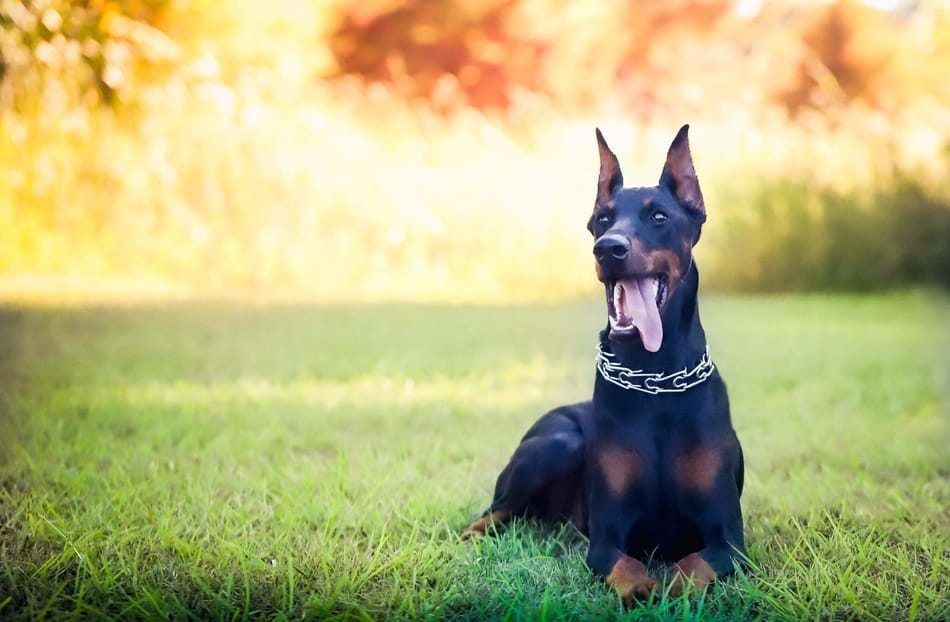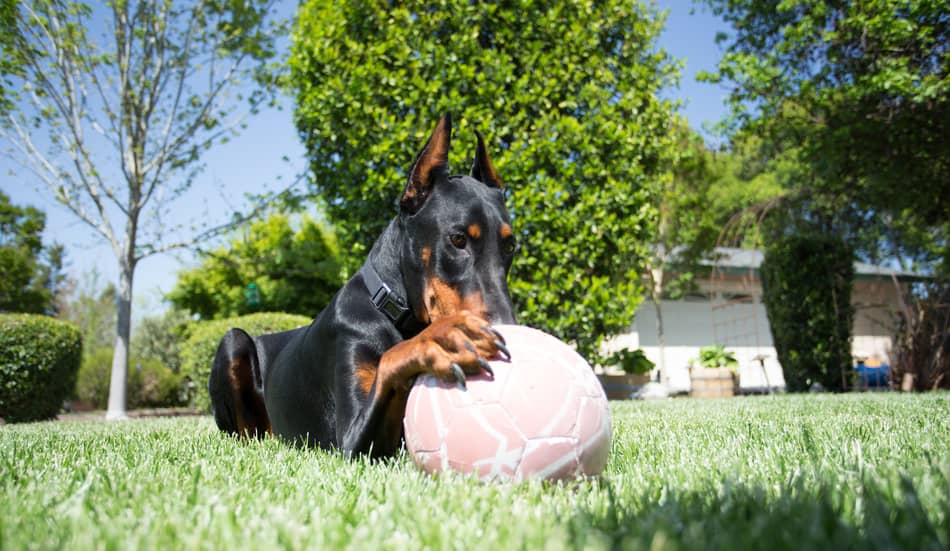
Recently, a friend of mine wanted to get a dog for his family. He told me that he absolutely loved Doberman Pinschers but that his wife would only let him get a dog that could primarily live outside. So I decided to spend the next half a day researching the characteristics of the Doberman to find out if it’s possible for them to be kept as “outside dogs.”
Can Dobermans live outside? Doberman Pinschers cannot live outdoors. They don’t have the mental or physical characteristics necessary to be outside dogs. Their short single layer coats and low body fat means they don’t do well exposed to the elements, especially in cold climates. They also need frequent human interaction.
There is actually a lot to consider when deciding whether any dog can live outdoors. How long your Doberman can be outside and away from normal interactions with the family will depend on a number of factors as well. You just might be in for a surprise if you leave your Doberman alone in your backyard for too long.
Why Dobermans Make Poor Outside Dogs
Many people love the idea of getting a Doberman Pinscher. After all, they’re a proud and elegant breed. They’re also great family dogs, fearless family protectors, and one of the top dog breeds in terms of intelligence. And talk about trainable! You can impress your friends all day long with the tricks your Doberman can learn.
But, if you aren’t prepared to have your dog live inside your home with the family, a Doberman is one of the worst dog breeds you could choose. Here are some of the main reasons why these magnificent dogs are horrible as outside-only dogs.
Physical Characteristics
- Single Layer Coats with Short Hair: Their fur is great when it comes to minimal shedding inside the home, but it’s not so great at keeping them warm when it’s cold out.
- Thin Skin: Their skin is not like humans. It’s thinner and leaves them just that much more exposed to the elements.
- Low Body Fat: These are lean, muscular dogs with very little body fat. Fat is the body’s natural insulation and protection from the elements. Dobermans have very little of this protection.
Mental Characteristics
- An Instinctual Need to Have Human Interaction: Dobermans need lots of human interaction. This is probably the most important reason why they don’t make good outside dogs.
- Highly Intelligent: Having a high level of intelligence means that they will not only realize that their family has separated themselves from them, but it means they’ll also get bored easily.
- A Need for Human Interaction: Doberman’s were originally bred to be put to work providing personal protection. As such, they developed an instinctual need to bond to their human counterparts. They’re often called a “Velcro Dog” because of their desire to stick right by your side at all times.
- Need for to Be “Part of the Pack”: Dogs, in general, are pack animals. They thrive when they are in a close pack (or family). This is what makes them feel safe and secure.
Although each individual dog will show slight variations, these mental characteristics are typical of the Doberman Pinscher. Let’s face it, we love these dogs because they are such great loyal family dogs and amazing protectors. With those traits comes some of these realities that you should be prepared for.
Doberman’s in Hot Weather
Doberman’s are dark colored (or black) dogs and seem to absorb heat quickly. They’re also very muscular and seem to have a thirst that will cause them to suck down even the largest water bowl in just a few minutes.
You should avoid the extreme heat with your Doberman. It’s easy for these dogs to get heat stroke if overworked on a particularly hot day. If the temperature outside is anything over about 104 degrees Fahrenheit, you should only let your dog out for short durations. Otherwise, it’s best to keep them indoors.
If it’s an unusually hot day and your dog is outside (especially if they’re being physically active), make sure he has access to cool shaded areas and plenty of water.

Doberman’s in Cold Weather
As you’ve probably figured out, Doberman’s don’t tolerate the cold very well. In fact, although Doberman’s were used as Police dogs heavily in the United States in the past, in recent years many departments have steered away from Dobermans specifically because of how poorly they do in cold weather.
Doberman’s will shiver quite easily while outdoors and anything below about 55 degrees Fahrenheit will not be tolerated well by your Dobie. Their short fur leaves them very exposed to the elements.
Tossing in the fact that they desire so desperately to be with humans means your Doberman will more than likely prefer to stand, shivering in the freezing rain looking in your sliding glass door waiting to join the family, than be huddled up in his doghouse trying to stay warm.
To know when you should put a coat on your Dobie, see my article Do Dobermans Need to Wear Coats in the Winter?
What Happens if a Doberman is Left Alone Outside
If you leave your Doberman Pinscher outside for an extended period of time it isn’t terribly uncommon for them to lash out in many destructive ways. They will quickly get frustrated and likely suffer separation anxiety since they have the natural instinct to be very close to their masters.
The following are some common behaviors of a Doberman left alone for significant periods of time:
- Excessive barking.
- Eating plants around the yard they normally wouldn’t eat.
- Increased aggression towards people.
- Digging holes and destroying landscaping.
Often when a Doberman is left outdoors all day he will bark like crazy and you’ll find yourself scrambling to find ways to stop the barking. You might even get a little love note from your neighbors when you get home from work about the noise. Your dog might also do some other unpleasant things in your backyard out of frustration such as digging holes in your yard, eating plants (even potentially poisonous ones), and having a field day with your irrigation system.
If left alone for long periods of time your Dobie can also start to develop aggression issues. Historically, outside dogs tend to show more aggression towards humans than their inside-only counterparts. For a large, powerful breed like the Doberman, issues with aggression can be a serious problem.
Using Heated Dog Houses
Many people believe that as long as they provide their Dobie with nothing but the best of accommodations outdoors, that they can then be outside dogs. Unfortunately, the truth is, even if you provide them with the taj mahal of dog houses with built-in heaters, fans, and water dispensers, they still won’t fare well.
Providing a plush dog house doesn’t address the large mental related issues that surround leaving your Doberman outside at night or for many hours during the day. It’s also very likely it won’t be used as often as you think anyway since they will be seeking out other humans as much as possible the entire time, even to their own detriment in freezing temperatures.
Final Thoughts
Doberman’s clearly are not cut out to be outdoor dogs. They aren’t built for it physically and are happiest when they’re apart of the family. Frankly, they will also be a better protector when they are bonded with the family, which is one of the biggest benefits of owning a Doberman.
Now that I have owned my Dobie for about 5 years and have talked with many other Doberman owners, I know that I ‘m not alone with some of the strange behaviors I have seen from my dog. Now I know they are mostly related to my dog’s genetics and an overall aversion to poor weather.

I remember seeing my Doberman go out into the backyard to pee, and lift his feet unusually high when it was raining. If the grass was wet one day after the sprinklers went off, I’d see him quickly run out into the grass, pee, and run back onto the concrete as quickly as possible with those same high-prancing steps. As funny as it was to watch, the reason he did this was he hated getting wet and cold. Not something you’d expect from a dog.
I used to think there was something wrong with my dog but from my research, speaking to other Doberman owners, and just getting to know my dog better I learned it’s really just the cold hard truth when it comes to Doberman’s: they hate being out in the elements and should only be kept as primarily indoor dogs.
Related Questions
Can Dobermans be in the cold? With short fur and a single layer coat, Doberman Pinschers are not built well for cold climates. Exposure to temperatures below 55 degrees Fahrenheit (or about 13 degrees Celsius) should be limited.
What temperature is too cold for a Doberman? Generally, anything below 55 degrees Fahrenheit (or about 13 degrees Celsius) is not well tolerated by the Doberman Pinscher. The Doberman doesn’t do well in cold weather.



I’m really wanting a doberman pinscher but my family won’t allow one to be an inside *inside* dog. I’m an I’ll person really looking for a companion and I just love to train and bond with dogs. My family said I would be allowed to keep him or her in our garage (which is directly attached to our house). If that were to be the case, I’ve planned on buying a kennel and surrounding the outside of the kennel with space (hypothermia) blankets (like draping them around the sides to keep the heat in and cold out. I’d also be putting a dog safe heater inside, as well as giving him or her an insulated dog house (at least four inches off of the floor). I would also have “self heating” blankets for the dog and cover the floor inside of the kennel with something soft. Of course he or she would have the best dog food, water, and bowls too. I’ve consider putting something for me out there too in case I want to stay with the doggy sometimes because I probably will. The hope is that, exception of the night, the dog and I will always be together. I would never leave him outside outside either. Does this seem okay to you???
I really can’t comment on your setup because I don’t know how safe it would be without thoroughly inspecting it. Be careful of cords and power anywhere near the dog (especially when the dog is teething and wanting to chew everything). Other than that, the best I can say is if you would be willing to sleep in the situation you put your dog in, then it’s probably fine. If you’re not, then it’s probably not good enough. Even if it is good enough for you, I would also add that the dog can’t be kept in the garage all day and no matter how nice the setup is they are going to want to spent as much of the day as possible directly with you to be happy. Good luck!
Agreed 100%. My dobbie got severe hypothermia when the furnace went out and the house went down to below 50. (She was in a coat, but even that wasn’t enough for her short fur and non-existent body fat. I warmed her up and she’s fine now, but it was a terrifying day!) I used to let her outside thinking it would be “fun”, but she HATES being outside without me. (She’d rather be crated indoors. And when indoors, often cuddles up next to a space heater if I’m willing to turn it on for her.)
I can’t imagine her as an outdoor dog. She has neither the physical nor mental disposition. She wants to be by her people always and, failing that, wants to be somewhere warm and comfortable. Thank you for this! People should not make dobbies outside dogs. It’s not something they’re designed for. (They’d be far better as apartment dogs, provided the apartment dweller likes long walks!)
I came across this because I’ve been reading & seeing videos about Dobermans actually liking snow or colder weather. Definitely NOT MINE! We Recently moved to Carolina from California & the it’s not even winter yet & it’s already way colder than what we’re used to. My 3yr old Doberman is an indoor dog & absolutely hates if I leave him outside. P.S. he’s a huge mommies boy 😊 but lately he’s been shivering & laying in front of the heater all the time. I thought maybe he’s just to pampered as to maybe why he seems really effected by the cold. Well I’m so glad I read this! Now I know he isn’t weird & just needs a coat when he goes out. Thank you!
Definitely not alone on that one! Dobermans seem to universally hate the cold. My Dobie will curl up in front of the fireplace when it’s 70 degrees outside.